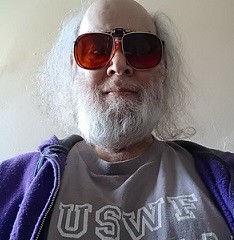Sunday, March 12, 2006
Dr. Wafa Sultan: Fanaticism vs. Rationality
In 1979, when Dr. Wafa Sultan was still a medical student at the University of Aleppo in her native Syria, she experienced what she described as “the turning point of my life.”
Now a psychiatrist based in California and an American citizen, she recounted in a March 9 radio interview with Tovia Singer on Israel National Radio how during one of her classes, Islamic terrorists burst into the classroom and began firing at her professor.
“They filled his body with hundreds of bullets before my eyes while they were screaming, ‘Allah is great, Allah is great,’” she said. “At that moment I was traumatized. I had just lost trust in their god and started to question his teaching.” (Her interview starts about 26 minutes into this show.)
Ever since she has been refining her views on just why the Arab and Muslim worlds have largely remained captive of what she describes as “a mentality that belongs to the Middle Ages.”
She recently elaborated on her views in a must-see interview on Feb. 21 on the Qatar-based, Arabic-language Aljazeera television, which can be viewed for free online in its original Arabic with English subtitles. There she was paired with Dr. Ibrahim al-Khouli, an Egyptian professor of religious studies, but the show turned more into a virtuoso performance as her adversary could say little against her.
Just click here to see the interview. Save that link because you will most likely want to watch it again and send it to other people.
In a booming voice and with the unwavering authority that knowledge gained the hard way provides, she said, according to a transcript of this show:
“The clash we are witnessing around the world is not a clash of religions, or a clash of civilizations. It is a clash between two opposites, between two eras. It is a clash between a mentality that belongs to the Middle Ages and another mentality that belongs to the 21st century. It is a clash between civilization and backwardness, between the civilized and the primitive, between barbarity and rationality. It is a clash between freedom and oppression, between democracy and dictatorship. It is a clash between human rights, on the one hand, and the violation of these rights, on other hand. It is a clash between those who treat women like beasts, and those who treat them like human beings. What we see today is not a clash of civilizations. Civilizations do not clash, but compete.”
She also very favorably compares the contributions made to world civilization by Jews with those made by Muslims.
Such clearly and concisely stated humanism coming from a Syrian-born woman who was brought up in an Islamic culture and in a closed, one-party military dictatorship has caught the attention of the world’s media. After numerous blogs and web sites began reporting on the buzz and excitement about Dr. Sultan which was reverberating throughout the world, and after over one million downloads of her Aljazeera interview, she was profiled in a front page story in the Saturday edition of The New York Times.
However, although The Times’ piece afforded Dr. Sultan perhaps the widest coverage she has received in the English-speaking world, the article contains at least one major error.
It is entitled “For Muslim Who Says Violence Destroys Islam, Violent Threats”. The article does say, “She said she no longer practiced Islam. ‘I am a secular human being,’ she said.”
Yet in the Aljazeera interview – which is hyperlinked next to this article on The Times’ web site – she goes much further than what The Times decided to include here. She stated:
“I am not a Christian, a Muslim, or a Jew. I am a secular human being. I do not believe in the supernatural, but I respect others' right to believe in it.”
When Dr. Al-Khouli asked her if she was a heretic, she replied: “You can say whatever you like. I am a secular human being who does not believe in the supernatural.”
Thus The Times chose to edit out the fact that Dr. Sultan clearly stated that she no longer considers herself a Muslim or is a believer in anything “supernatural.” Whether she is an atheist, an agnostic, or simply prefers to be identified with the term she used on Aljazeera, “secular,” is not specified. But what is crystal clear is that she does not consider herself a Muslim. No doubt that news was not fit to print in The Times.
To understand better, however, why the type of fanaticism she is so courageously and brilliantly campaigning against has taken hold among so many Arab and Muslim people, all you have to do is look at that same Saturday edition of The Times at the article directly above her profile.
This one is called "Symbol of Abu Ghraib Seeks to Spare Others His Nightmare". It is a profile of Ali Shalal Qaissi, a former prisoner at that notorious prison in Iraq.
In the print edition, right above that article is a current photograph of a gray-haired and bespectacled Qaissi holding a much more famous photograph of himself from two years ago. In that one, apparently taken by a member of the U.S. military in Iraq when he was a prisoner in Abu Ghraib, he is seen wearing a pointed hood covering his entire head, standing on a box, holding his arms in an outstretched position, and with electrical wires attached to him.
As The Times correctly wrote, this photo “became the indelible symbol of the torture at Abu Ghraib, west of Baghdad.”
All this muddies up the good vs. evil debate quite a lot. Dr. Sultan was, obviously, addressing the Arabic-speaking world on Aljazeera when she argued that the supposed clash of civilizations was really “a clash between freedom and oppression, between democracy and dictatorship. It is a clash between human rights, on the one hand, and the violation of these rights, on other hand.”
With atrocities such as Abu Ghraib by the U.S.-led forces in Iraq, it becomes a much harder sell to convince those to whom she is appealing that all these laudable values are actually practiced in deed in the West and are the sole possession of their culture as well.
Then again, someone like Dr. Sultan who has condemned barbarity and embraced rationality should be expected to address these concerns. I, for one, cannot wait to hear any and all interviews with her again, to read what she has written, and, if I can arrange it, to interview her myself.
Now a psychiatrist based in California and an American citizen, she recounted in a March 9 radio interview with Tovia Singer on Israel National Radio how during one of her classes, Islamic terrorists burst into the classroom and began firing at her professor.
“They filled his body with hundreds of bullets before my eyes while they were screaming, ‘Allah is great, Allah is great,’” she said. “At that moment I was traumatized. I had just lost trust in their god and started to question his teaching.” (Her interview starts about 26 minutes into this show.)
Ever since she has been refining her views on just why the Arab and Muslim worlds have largely remained captive of what she describes as “a mentality that belongs to the Middle Ages.”
She recently elaborated on her views in a must-see interview on Feb. 21 on the Qatar-based, Arabic-language Aljazeera television, which can be viewed for free online in its original Arabic with English subtitles. There she was paired with Dr. Ibrahim al-Khouli, an Egyptian professor of religious studies, but the show turned more into a virtuoso performance as her adversary could say little against her.
Just click here to see the interview. Save that link because you will most likely want to watch it again and send it to other people.
In a booming voice and with the unwavering authority that knowledge gained the hard way provides, she said, according to a transcript of this show:
“The clash we are witnessing around the world is not a clash of religions, or a clash of civilizations. It is a clash between two opposites, between two eras. It is a clash between a mentality that belongs to the Middle Ages and another mentality that belongs to the 21st century. It is a clash between civilization and backwardness, between the civilized and the primitive, between barbarity and rationality. It is a clash between freedom and oppression, between democracy and dictatorship. It is a clash between human rights, on the one hand, and the violation of these rights, on other hand. It is a clash between those who treat women like beasts, and those who treat them like human beings. What we see today is not a clash of civilizations. Civilizations do not clash, but compete.”
She also very favorably compares the contributions made to world civilization by Jews with those made by Muslims.
Such clearly and concisely stated humanism coming from a Syrian-born woman who was brought up in an Islamic culture and in a closed, one-party military dictatorship has caught the attention of the world’s media. After numerous blogs and web sites began reporting on the buzz and excitement about Dr. Sultan which was reverberating throughout the world, and after over one million downloads of her Aljazeera interview, she was profiled in a front page story in the Saturday edition of The New York Times.
However, although The Times’ piece afforded Dr. Sultan perhaps the widest coverage she has received in the English-speaking world, the article contains at least one major error.
It is entitled “For Muslim Who Says Violence Destroys Islam, Violent Threats”. The article does say, “She said she no longer practiced Islam. ‘I am a secular human being,’ she said.”
Yet in the Aljazeera interview – which is hyperlinked next to this article on The Times’ web site – she goes much further than what The Times decided to include here. She stated:
“I am not a Christian, a Muslim, or a Jew. I am a secular human being. I do not believe in the supernatural, but I respect others' right to believe in it.”
When Dr. Al-Khouli asked her if she was a heretic, she replied: “You can say whatever you like. I am a secular human being who does not believe in the supernatural.”
Thus The Times chose to edit out the fact that Dr. Sultan clearly stated that she no longer considers herself a Muslim or is a believer in anything “supernatural.” Whether she is an atheist, an agnostic, or simply prefers to be identified with the term she used on Aljazeera, “secular,” is not specified. But what is crystal clear is that she does not consider herself a Muslim. No doubt that news was not fit to print in The Times.
To understand better, however, why the type of fanaticism she is so courageously and brilliantly campaigning against has taken hold among so many Arab and Muslim people, all you have to do is look at that same Saturday edition of The Times at the article directly above her profile.
This one is called "Symbol of Abu Ghraib Seeks to Spare Others His Nightmare". It is a profile of Ali Shalal Qaissi, a former prisoner at that notorious prison in Iraq.
In the print edition, right above that article is a current photograph of a gray-haired and bespectacled Qaissi holding a much more famous photograph of himself from two years ago. In that one, apparently taken by a member of the U.S. military in Iraq when he was a prisoner in Abu Ghraib, he is seen wearing a pointed hood covering his entire head, standing on a box, holding his arms in an outstretched position, and with electrical wires attached to him.
As The Times correctly wrote, this photo “became the indelible symbol of the torture at Abu Ghraib, west of Baghdad.”
All this muddies up the good vs. evil debate quite a lot. Dr. Sultan was, obviously, addressing the Arabic-speaking world on Aljazeera when she argued that the supposed clash of civilizations was really “a clash between freedom and oppression, between democracy and dictatorship. It is a clash between human rights, on the one hand, and the violation of these rights, on other hand.”
With atrocities such as Abu Ghraib by the U.S.-led forces in Iraq, it becomes a much harder sell to convince those to whom she is appealing that all these laudable values are actually practiced in deed in the West and are the sole possession of their culture as well.
Then again, someone like Dr. Sultan who has condemned barbarity and embraced rationality should be expected to address these concerns. I, for one, cannot wait to hear any and all interviews with her again, to read what she has written, and, if I can arrange it, to interview her myself.
Comments:
Post a Comment















